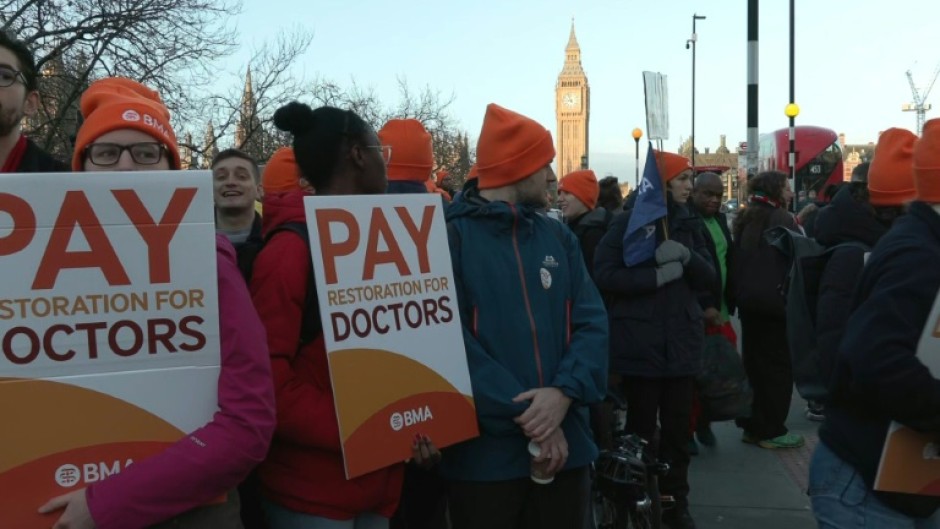LONDON - Hospital doctors in England on Wednesday began their longest consecutive strike in the seven-decade history of Britain's National Service (NHS).
Junior doctors -- those below consultant level -- started a six-day walkout at 0700 GMT, in a major escalation of their long-running pay dispute with the UK government.
The industrial action, which ends next Tuesday, comes at one of the busiest times of the year for the state-funded NHS, when it faces increased pressure from winter respiratory illnesses.
It also quickly follows a three-day strike held by doctors just before Christmas, part of a wider series of stoppages across several sectors sparked by high inflation and a cost-of-living crisis.
Striking doctors say their wages have gone down by a quarter in real terms under the current government, which has been in power since 2010.
On a picket line outside St Thomas' Hospital, across the River Thames from the UK parliament in London, medics held up signs calling for better funding for the overstretched health service.
Others read "£15/hour is not a fair wage for a junior doctor" and "Reduced pay keeps the doctor away", with a map of Australia, which has previously advertised for UK-based staff to move.

"A lot of doctors are moving to Australia, not just because of the pay but also the work-life balance is better," said one doctor, Georgia Blackwell, 28.
"Other countries understand that doctors aren't being paid adequately and they're offering much better packages," added Shivani Ganesh, a 23-year-old medical student.
- Impact -
UK Health Secretary Victoria Atkins warned that the latest strikes will have a "serious impact" on patients across the country.
More than 1.2 million appointments have been rescheduled since the start of the strikes, including more than 88,000 last month, she added.
"I urge the BMA Junior Doctors Committee to call off their strikes and come back to the negotiating table so we can find a fair and reasonable solution to end the strikes once and for all," Atkins said.
Junior doctors have gone on strike seven times since March.

The British Medical Association (BMA) announced the walkout in December after a breakdown in talks with the government.
The union said junior doctors have been offered a 3.0-percent rise on top of the average 8.8-percent increase they were given earlier this year.
It rejected the offer because the cash would be split unevenly across different doctor grades and would "still amount to pay cuts for many doctors" after inflation.
The co-chair of the BMA Junior Doctors Committee, Robert Laurenson, accused the government of failing to broker new talks.
"Strike action is the only thing this government will sit down and listen to," he told AFP, warning of more strikes to come without a "credible" pay offer.
The NHS itself said the latest stoppage, which could see up to half of the medical workforce on picket lines, would have "a significant impact on almost all routine care".
"This January could be one of the most difficult starts to the year the NHS has ever faced," said its national medical director, Stephen Powis.
- 'Significant' -
The NHS typically sees a rise in the number of people in hospital in the two weeks after Christmas, due to people delaying seeking treatment in order to spend the festive season with loved ones.

Julian Hartley, the chief executive of NHS Providers which represents hospital groups in England, said the effect of the strikes on patients would be "significant".
"The vast majority of planned operations, appointments, and so on, will have to be stood down," he told BBC television.
Consultants will cover for junior doctors and emergency and urgent care such as maternity and intensive care services will be operating.
But there are fears that Covid, flu and other seasonal conditions could also hit staffing.
"We're deeply concerned about the kind of impact over the coming days," said Hartley.

